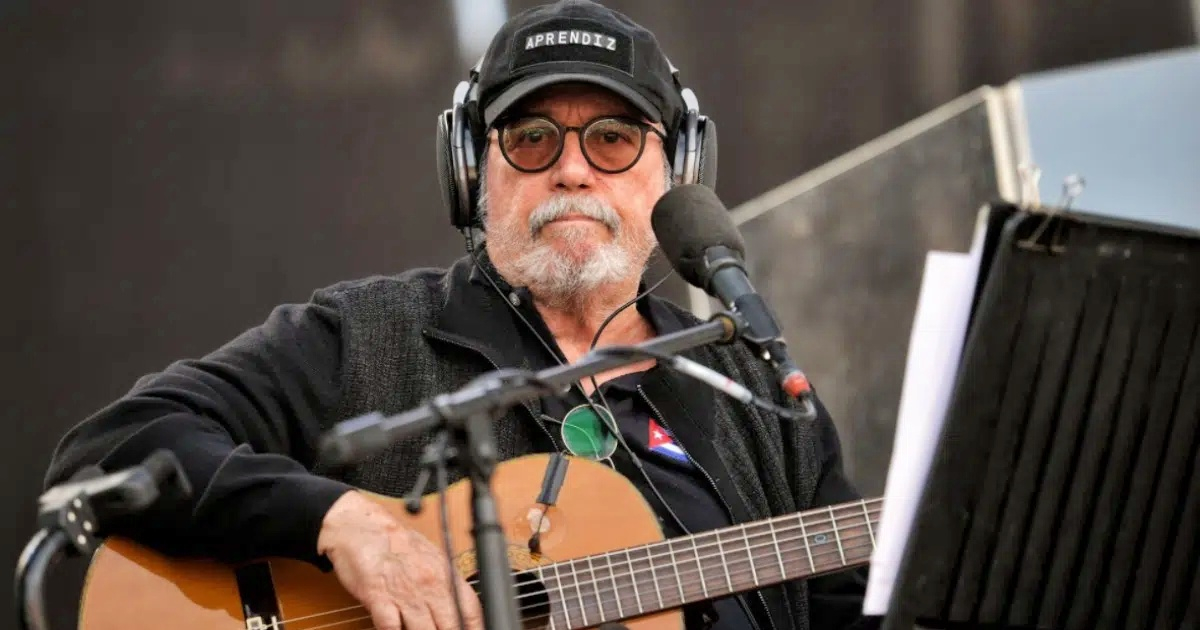Silvio Rodríguez has recently expressed strong criticism toward the Cuban government and its flawed economic policies, suggesting they are leading to destruction. From the discreet and secure platform of his blog, Segunda Cita—where the composer of "Ojalá" filters third-party comments—Rodríguez commented on the devastating analysis by economist Juan Triana Cordoví, a professor at the government-affiliated Center for the Study of the Cuban Economy at the University of Havana. This week, Triana Cordoví criticized Díaz-Canel for failing to recognize his responsibility in the economic debacle.
In response to Triana Cordoví's article, Rodríguez shared his thoughts "in a timely and cheerful manner," as he foreshadowed in his song "Resumen de noticias." "We created a complicated apparatus that seemed to work at one point, but now it's a burden," said Rodríguez. He then quoted lines from his song "Sea señora": "When the wings become iron bars / it's time to journey back / to José Martí's seed."
"As Fidel said several times: only we can destroy this ourselves. It's sad to see, but I think that's what's happening," the troubadour remarked. "If we don't quickly dismantle what holds us back, our own creations will devour us. They're already chewing us up. Let's wake up," he warned.
In another part of his commentary on Triana's article, Rodríguez referenced the "little serpents of '74," a clear nod to his iconic song "Sueño con serpientes," saying that today they have become "horrendous monsters."
Without mincing words, Rodríguez attacked the bureaucratic obstacles that hinder progress in Cuba. "There are so many—just so many—bureaucratic hurdles that I know several potential investors have given up on projects due to the delays imposed by the government apparatus," he pointed out.
"I won't go into details, but this happens both with foreign investments and ideas from intelligent and creative Cubans who haven't wanted to leave, who continue betting on their country, who have been trying for years to do things that would benefit us but are thwarted by a sick bureaucracy," he added.
Has Silvio Rodríguez Awakened?
This is not the first time in recent months that the author of "Unicornio," now 77, has commented on what many consider obvious truths, but ones he seems to have only recently realized. In June 2023, in another notable blog post, he suggested that the Cuban government needs "a change of mentality" and to "lose the fear" of economic models that could ensure collective well-being.
Rodríguez recently admitted that he no longer feels comfortable singing the phrase "I live in a free country," a line from his equally iconic "Pequeña serenata diurna."
In an interview with The Associated Press, he acknowledged that the crisis in Cuba is "terrible," especially for the elderly who dedicated their lives to the revolution and now do not have enough to survive. "Most people everywhere just want to live their lives in peace, make a little progress, have some opportunities," he noted.
Earlier in March, in an interview with El Español, Rodríguez expressed understanding toward the young people emigrating from Cuba due to the current crisis.
The troubadour, who recently released the 22nd album of his career, titled "Quería saber," remains an influential voice in leftist thought within the political and cultural landscape of both Cuba and the rest of Latin America. However, something seems to be changing within him.
"At least half of the Argentine people chose him, and on principle, that always deserves respect," he said about Argentine President Javier Milei in an interview with the Chilean newspaper La Tercera, comments that likely did not sit well in the Palace of the Revolution in Havana.
Silvio Rodríguez's Critique of Cuba's Economic Policies
In light of Silvio Rodríguez's recent criticism of Cuba's economic policies, several questions arise that may help readers better understand the situation.
What specific economic policies did Silvio Rodríguez criticize?
Rodríguez criticized the Cuban government's complex and burdensome economic policies, suggesting they are leading the country toward destruction. He also highlighted the excessive bureaucratic obstacles that deter both foreign and local investments.
Who is Juan Triana Cordoví, and what was his role in this critique?
Juan Triana Cordoví is an economist and professor at the Center for the Study of the Cuban Economy at the University of Havana. His analysis criticized Díaz-Canel for not acknowledging his role in the economic failures, which prompted Rodríguez to share his own critical views.
How has Silvio Rodríguez's perspective on Cuba changed recently?
In recent months, Rodríguez has become more vocal about the need for a change in the Cuban government's mentality and has expressed discomfort with once-cherished revolutionary ideals. He has also shown empathy for younger generations emigrating due to the current crisis.
